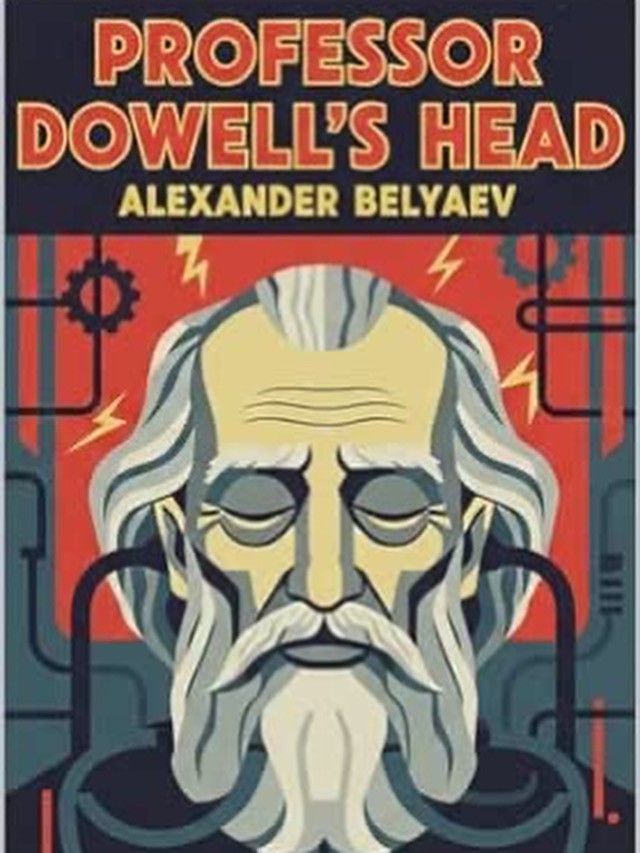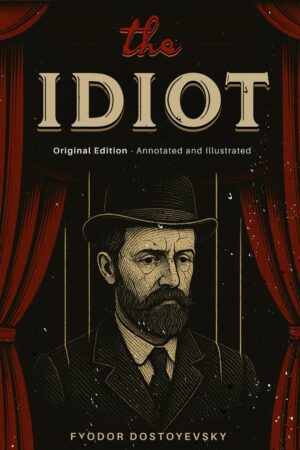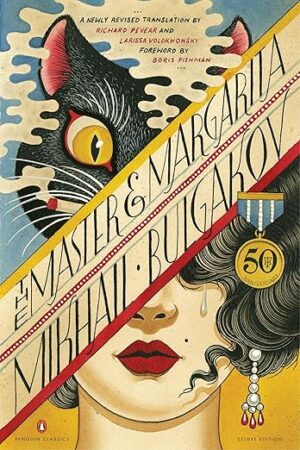First Encounter
“Please, have a seat.”
Marie Laurent settled into a deep leather armchair.
While Professor Kern opened the envelope and read the letter, she quickly scanned the office.
What a gloomy room! But it’s good for working here: nothing distracts your attention. A lamp with a thick lampshade illuminated only the desk, which was piled high with books, manuscripts, and galley proofs. Her eye could barely make out the solid black oak furniture. Dark wallpaper, dark drapes. In the semi-darkness, only the gold of embossed bindings in heavy cabinets shimmered. The long pendulum of an old wall clock swung steadily and smoothly.
Shifting her gaze to Kern, Laurent involuntarily smiled: the professor himself entirely matched the style of the office. As if carved from oak, Kern’s ponderous, severe figure seemed part of the furnishings. His large, tortoiseshell-rimmed glasses resembled two clock faces. Like pendulums, his gray-ash eyes moved, scanning line after line of the letter. His rectangular nose, straight-cut eyes and mouth, and square, protruding chin gave his face the look of a stylized decorative mask, sculpted by a Cubist.
“It’s strange to decorate a fireplace with such a mask,” Laurent thought.
“Colleague Sabatier has already spoken about you. Yes, I need an assistant. Are you a medical student? Excellent. Forty francs a day. Weekly payment. Breakfast, lunch. But I have one condition…”
Tapping a dry finger on the table, Professor Kern asked an unexpected question:
“Can you keep silent? All women are talkative. You are a woman — that’s bad. You are beautiful — that’s even worse.”
“But what does that have to do with…”
“Everything. A beautiful woman is doubly a woman. This means she possesses feminine flaws twofold. You might have a husband, a friend, a fiancé. And then all secrets go to hell.”
“But…”
“No ‘buts’! You must be mute as a fish. You must keep silent about everything you see and hear here. Do you accept this condition? I must warn you: non-compliance will lead to extremely unpleasant consequences for you. Extremely unpleasant.”
Laurent was confused and intrigued…
“I agree, if there’s no…”
“Crime, you mean? You can be completely at ease. And you face no responsibility whatsoever… Are your nerves in order?”
“I’m healthy…”
Professor Kern nodded.
“No alcoholics, neurasthenics, epileptics, lunatics in your family line?”
“No.”
Kern nodded again.
His dry, sharp finger pressed the electric doorbell.
The door opened silently.
In the room’s dim light, as if on a developing photographic plate, Laurent first saw only the whites of the eyes, then gradually the glints of a shiny black man’s face emerged. His black hair and suit blended with the dark drapes of the door.
“John! Show Mademoiselle Laurent the laboratory.”
The black man nodded, inviting her to follow, and opened a second door.
Laurent entered a completely dark room.
A switch clicked, and the bright light of four frosted hemispheres flooded the room. Laurent involuntarily covered her eyes. After the semi-darkness of the gloomy office, the whiteness of the walls was dazzling… The glass cabinets sparkled with gleaming surgical instruments. Steel and aluminum of apparatuses unfamiliar to Laurent shone with a cold light. Warm, yellow glints of light fell on polished copper parts. Tubes, coils, flasks, glass cylinders… Glass, rubber, metal…
In the middle of the room was a large dissection table. Next to the table, a glass box; inside it, a human heart pulsated. Tubes ran from the heart to cylinders.
Laurent turned her head aside and suddenly saw something that made her start as if from an electric shock.
A human head looked at her — a head without a torso.
It was attached to a square glass plate. The plate was supported by four tall, gleaming metal legs. From the severed arteries and veins, through openings in the glass, tubes, already joined in pairs, ran to cylinders. A thicker tube emerged from the throat and connected to a large cylinder. The cylinder and cylinders were equipped with valves, pressure gauges, thermometers, and devices unknown to Laurent.
The head looked at Laurent attentively and mournfully, blinking its eyelids. There could be no doubt: the head lived, separated from the body, an independent and conscious life.
Despite the shocking impression, Laurent couldn’t help but notice that this head was strikingly similar to that of the recently deceased renowned scientist-surgeon, Professor Dowell, famous for his experiments in reanimating organs excised from fresh cadavers. Laurent had often attended his brilliant public lectures, and she distinctly remembered that high forehead, characteristic profile, wavy, thick light-brown hair streaked with silver, blue eyes… Yes, it was Professor Dowell’s head. Only his lips and nose had grown thinner, his temples and cheeks sunken, his eyes deeper set in their orbits, and his white skin had taken on the yellowish-dark hue of a mummy. But in his eyes there was life, there was thought.
Laurent, as if mesmerized, could not tear her gaze from those blue eyes.
The head silently moved its lips.
This was too much for Laurent’s nerves. She was close to fainting. The black man supported her and led her out of the laboratory.
“It’s horrible, it’s horrible…” Laurent repeated, sinking into the armchair.
Professor Kern silently drummed his fingers on the table.
“Tell me, is that really the head…?”
“Professor Dowell’s? Yes, it’s his head. The head of Dowell, my deceased esteemed colleague, brought back to life by me. Unfortunately, I could only resurrect the head. Not everything comes at once. Poor Dowell suffered from an incurable ailment. Dying, he bequeathed his body for the scientific experiments we conducted together. ‘My whole life was dedicated to science. Let my death also serve science. I prefer a scientist-friend to dig in my corpse rather than a grave worm’ — that’s the will Professor Dowell left. And I received his body. I managed not only to revive his heart but also to resurrect his consciousness, to resurrect his ‘soul,’ to use the language of the crowd. What’s so horrible about that? People have considered death horrible until now. Hasn’t resurrection from the dead been humanity’s thousand-year dream?”
“I would prefer death to such a resurrection.”
Professor Kern made an indefinite gesture with his hand.
“Yes, it has its inconveniences for the resurrected. Poor Dowell would find it awkward to appear in public in such an… incomplete state. That’s why we keep this experiment a secret. I say ‘we’ because that is Dowell’s own wish. Besides, the experiment isn’t finished yet.”
“And how did Professor Dowell, that is, his head, express this wish? Can the head speak?”
Professor Kern was momentarily flustered.
“No… Professor Dowell’s head doesn’t speak. But it hears, understands, and can respond with facial expressions…”
And to change the subject, Professor Kern asked:
“So, do you accept my offer? Excellent. I’ll expect you tomorrow at nine in the morning. But remember: silence, silence, and silence.”
The Secret of the Forbidden Tap
Life hadn’t been easy for Marie Laurent. She was seventeen when her father died. The care of her ailing mother fell upon Marie. The small funds left by her father didn’t last long; she had to study and support the family. For several years, she worked as a night proofreader at a newspaper. After qualifying as a doctor, she tried in vain to find a position. There was an offer to go to the perilous lands of New Guinea, where yellow fever raged. Marie didn’t want to go there with her sick mother, nor did she want to be separated from her. Professor Kern’s offer seemed a way out of her situation.
Despite the work’s strangeness, she agreed almost without hesitation.
Laurent didn’t know that Professor Kern had thoroughly checked her references before accepting her.
She had been working for Kern for two weeks. Her duties were simple. She had to monitor the apparatuses that sustained the head’s life throughout the day. At night, John replaced her.
Professor Kern explained to her how to handle the taps on the cylinders. Pointing to the large cylinder from which a thick tube led to the head’s throat, Kern strictly forbade her from opening its tap.
“If you turn that tap, the head will be immediately killed. Sometime I will explain the entire system for feeding the head and the purpose of this cylinder. For now, it’s enough for you to know how to operate the apparatuses.”
Kern, however, was in no hurry with the promised explanations.
A small thermometer was deeply inserted into one of the head’s nostrils. At specific hours, it had to be removed and the temperature recorded. The cylinders were also equipped with thermometers and pressure gauges. Laurent monitored the temperature of the liquids and the pressure in the cylinders. The well-regulated apparatuses gave no trouble, operating with clockwork precision. A highly sensitive device attached to the head’s temple registered pulsation, mechanically drawing a curve. The tape was changed daily. The contents of the cylinders were replenished in Laurent’s absence, before her arrival.
Marie gradually grew accustomed to the head and even befriended it.
When Laurent entered the laboratory in the morning, her cheeks flushed from walking and fresh air, the head faintly smiled at her, and its eyelids trembled in greeting.
The head could not speak. But soon, a conventional, though very limited, language was established between it and Laurent. Lowering the eyelids meant “yes,” raising them meant “no.” The silently moving lips helped somewhat too.
“How are you feeling today?” Laurent would ask.
The head would smile with a “shadow of a smile” and lower its eyelids: “well, thank you.”
“How was your night?”
The same miming.
While asking questions, Laurent nimbly performed her morning duties. She checked the apparatuses, temperature, and pulse. She made entries in the logbook. Then, with the utmost caution, she washed the head’s face with water and alcohol using a soft sponge, and wiped its earlobes with absorbent cotton. She removed a wisp of cotton hanging on its eyelashes. She rinsed its eyes, ears, and nose — special tubes were inserted into the mouth and nose for this purpose. She tidied its hair.
Her hands touched the head quickly and skillfully. The head’s face showed an expression of contentment.
“It’s a wonderful day today,” Laurent would say. “The sky is so blue. The air is crisp and frosty. It just makes you want to breathe deeply. Look how brightly the sun shines, quite like spring.”
Professor Dowell’s lips sadly drooped at the corners. His eyes gazed longingly at the window and then settled on Laurent.
She blushed, slightly annoyed with herself. With a sensitive woman’s instinct, Laurent avoided speaking about anything unattainable for the head that might unnecessarily remind it of the pitifulness of its physical existence.
Marie felt a kind of maternal pity for the head, as if for a helpless child wronged by nature.
“Well then, let’s get to work!” Laurent hastily said, to correct her mistake.
In the mornings, before Professor Kern arrived, the head would read. Laurent would bring a pile of the latest medical journals and books and show them to the head. The head would browse. At a relevant article, it would twitch its eyebrows. Laurent would place the journal on the lectern, and the head would immerse itself in reading. Laurent grew accustomed to guessing which line the head was reading by following its eyes, and turning the pages in time.
When a mark needed to be made in the margins, the head would signal, and Laurent would run her finger along the lines, following the head’s eyes, and mark the margin with a pencil.
Laurent didn’t understand why the head made her mark the margins, and with their meager mimetic language, she didn’t expect to get an explanation, so she didn’t ask.
But one day, passing through Professor Kern’s office in his absence, she saw journals on his desk with the marks she had made at the head’s direction. And on a sheet of paper, Professor Kern’s hand had transcribed the marked passages. This made Laurent ponder.
Recalling this now, Marie couldn’t resist asking. Perhaps the head could somehow answer.
“Tell me, why do we mark certain passages in scientific articles?”
An expression of displeasure and impatience appeared on Professor Dowell’s face. The head looked expressively at Laurent, then at the tap from which the tube led to its throat, and raised its eyebrows twice. This signified a request. Laurent understood that the head wanted the forbidden tap opened. This wasn’t the first time the head had made such a request to her. But Laurent interpreted the head’s wish in her own way: the head, evidently, wanted to end its bleak existence. And Laurent hesitated to open the forbidden tap. She didn’t want to be responsible for the head’s death; she was afraid of responsibility and of losing her job.
“No, no,” Laurent replied with fear to the head’s request. “If I open that tap, you will die. I don’t want to, I can’t, I dare not kill you.”
A spasm of impatience and a sense of powerlessness crossed the head’s face.
Three times it vigorously raised its eyelids and eyes…
“No, no, no. I won’t die!” — that’s how Laurent understood it. She hesitated.
The head began to move its lips silently, and Laurent felt as though the lips were trying to say: “Open it. Open it. I beg you!…”
Laurent’s curiosity was aroused to the extreme. She felt that some secret was hidden here.
Boundless longing shone in the head’s eyes. The eyes pleaded, implored, demanded. It seemed that all the power of human thought, all the intensity of will, was concentrated in that gaze.
Laurent made up her mind.
Her heart pounded, her hand trembled as she cautiously opened the tap.
Immediately, a hiss came from the head’s throat. Laurent heard a faint, muffled, cracked voice, rattling and hissing like a broken gramophone:
“Tha-nk… you…”
The forbidden tap released compressed air from the cylinder. Passing through the head’s throat, the air set the vocal cords in motion, allowing the head to speak. The throat muscles and cords could no longer work normally: air hissed through the throat even when the head wasn’t speaking. And the severance of nerve trunks in the neck area disrupted the normal function of the vocal cord muscles, giving the voice a muffled, rattling timbre.
The head’s face expressed satisfaction.
But at that moment, footsteps were heard from the office and the sound of a lock being opened (the laboratory door was always locked with a key from the office side). Laurent barely managed to close the tap. The hissing in the head’s throat stopped.
Professor Kern entered.
The Head Began to Speak
About a week had passed since Laurent discovered the secret of the forbidden tap.
During this time, an even friendlier relationship had developed between Laurent and the head. During the hours when Professor Kern was away at the university or clinic, Laurent would open the tap, directing a small stream of air into the head’s throat so that it could speak in a clear whisper. Laurent also spoke softly. They were afraid the black man might overhear their conversation.
Their conversations apparently had a good effect on Professor Dowell’s head. His eyes became livelier, and even the sorrowful wrinkles between his eyebrows smoothed out.
The head spoke a lot and willingly, as if compensating itself for the time of enforced silence.
Last night, Laurent dreamt of Professor Dowell’s head, and upon waking, she wondered: “Does Dowell’s head dream?”
“Dreams…” the head whispered softly. “Yes, I dream. And I don’t know what they bring me more of: sorrow or joy. I see myself in dreams as healthy, full of strength, and I wake up doubly dispossessed. Dispossessed both physically and morally. For I am deprived of everything accessible to living people. Only the ability to think is left to me. ‘I think, therefore I exist,’ the head quoted the philosopher Descartes with a bitter smile. ‘I exist…'”
“What do you see in your dreams?”
“I have never yet seen myself in my current form. I see myself as I once was… I see relatives, friends… Recently, I saw my deceased wife and relived the spring of our love with her. Betty once came to me as a patient, having injured her leg getting out of a car. Our first acquaintance was in my consulting room. We somehow immediately grew close. After her fourth visit, I offered to show her a portrait of my fiancée lying on the desk. ‘I will marry her if I get her consent,’ I said. She walked over to the desk and saw a small mirror on it; looking at it, she laughed and said, ‘I think… she won’t refuse.’ A week later, she was my wife. That scene recently flashed before me in a dream… Betty died here, in Paris. You know, I came here from America as a surgeon during the European war. I was offered a professorship here, and I stayed to live near her dear grave. My wife was an amazing woman…”
The head’s face brightened with memories, but immediately clouded over.
“How infinitely far away that time is!”
The head fell silent in thought. Air gently hissed in its throat.
“Last night I saw my son in a dream. I would very much like to see him again. But I dare not subject him to this ordeal… For him, I am dead.”
“Is he grown up? Where is he now?”
“Yes, he’s grown up. He’s almost the same age as you, or a little older. He finished university. He should currently be in England, with his aunt on his mother’s side. No, it would be better not to dream. But I,” the head continued after a pause, “am tormented not only by dreams. When I’m awake, false sensations torment me. Strange as it may seem, sometimes I feel my body. I suddenly want to take a deep breath, stretch, spread my arms wide, as a person who has been sitting too long does. And sometimes I feel a gout pain in my left leg. Isn’t that funny? Though, as a doctor, you should understand this. The pain is so real that I involuntarily look down and, of course, through the glass, I see empty space beneath me, the stone slabs of the floor… At times it seems to me that an asthma attack is about to begin, and then I am almost pleased with my ‘posthumous existence,’ which at least frees me from asthma… All this is purely reflex activity of brain cells once connected to the life of the body…”
“Horrible!…” Laurent couldn’t help but exclaim.
“Yes, horrible… Strangely, in life, it seemed to me that I lived by thought alone. I truly somehow didn’t notice my body, completely immersed in scientific pursuits. And only after losing my body did I feel what I had lost. Now, more than ever in my life, I think of the scent of flowers, fragrant hay somewhere at the edge of a forest, of long walks on foot, the sound of the sea surf… I haven’t lost my sense of smell, touch, and other senses, but I am cut off from the entire diversity of the world of sensations. The smell of hay is good in a field when it’s connected with a thousand other sensations: the smell of the forest, the beauty of a fading sunset, the songs of forest birds. Artificial smells could not replace natural ones for me. The scent of ‘Rose’ perfume instead of a flower? That would satisfy me as little as the smell of pâté without pâté would satisfy a hungry man. Having lost my body, I lost the world — the entire immense, beautiful world of things I hadn’t noticed, things that can be picked up, touched, and at the same time feel one’s body, oneself. Oh, I would gladly give up my chimerical existence for the single joy of feeling the weight of a simple cobblestone in my hand! If only you knew what pleasure the touch of a sponge gives me when you wash my face in the mornings. After all, touch is the only way for me to feel myself in the world of real things… All I can do myself is touch the tip of my tongue to the edge of my dry lips.”
That evening, Laurent returned home distracted and agitated. Her elderly mother, as usual, had prepared her tea with a cold snack, but Marie didn’t touch the sandwiches, quickly drank a glass of tea with lemon, and got up to go to her room. Her mother’s watchful eyes settled on her.
“You’re upset about something, Marie?” the old woman asked. “Perhaps trouble at work?”
“No, nothing, Mama, just tired and have a headache… I’ll go to bed early, and everything will pass.”
Her mother didn’t hold her back, sighed, and, left alone, fell into thought.
Since Marie had started this job, she had changed a lot. She had become nervous, withdrawn. Mother and daughter had always been great friends. There were no secrets between them. And now there was a secret. Old Mrs. Laurent felt that her daughter was hiding something. To her mother’s questions about work, Marie replied very briefly and vaguely.
“Professor Kern has a home clinic for patients who are particularly interesting from a medical point of view. And I take care of them.”
“What kind of patients are these?”
“Various ones. There are very difficult cases…” Marie would frown and change the subject.
These answers didn’t satisfy the old woman. She even began to make inquiries on her own, but she couldn’t find out anything beyond what her daughter had already told her.
“Could she be in love with Kern, and perhaps hopelessly so, without his reciprocation?…” the old woman thought. But then she contradicted herself: her daughter wouldn’t hide such a crush from her. And besides, wasn’t Marie pretty? And Kern was a bachelor. And if only Marie loved him, then, of course, Kern wouldn’t be able to resist. There wasn’t another Marie like her in the whole world. No, it must be something else… And the old woman couldn’t fall asleep for a long time, tossing and turning on her high feather bed.
Marie wasn’t sleeping either. She had turned off the light so her mother would think she was already asleep. Marie sat on the bed with wide-open eyes. She recalled every word from the head and tried to imagine herself in its place: she gently touched her own lips, palate, and teeth with her tongue, and thought:
“This is all the head can do. One can bite one’s lips, the tip of one’s tongue. One can twitch one’s eyebrows. Roll one’s eyes. Close and open them. Mouth and eyes. Not a single other movement. No, one can also move the skin on one’s forehead a little. And nothing else…”
Marie closed and opened her eyes and made faces. Oh, if only her mother had looked at her at that moment! The old woman would have decided her daughter had gone mad.
And suddenly Marie began to grab her shoulders, knees, arms, stroke her chest, run her fingers through her thick hair and whisper:
“My God! How happy I am! How much I have! How rich I am! And I didn’t know it, didn’t feel it!”
The fatigue of her young body took over. Marie’s eyes involuntarily closed. And then she saw Dowell’s head. The head looked at her attentively and sorrowfully. The head broke free from its table and flew through the air. Marie ran ahead of the head. Kern, like a hawk, swooped down on the head. Winding corridors… Tight doors… Marie hurried to open them, but the doors wouldn’t budge, and Kern was catching up to the head, the head was whistling, hissing right by her ear… Marie felt like she was suffocating. Her heart pounded in her chest, its rapid beats painfully echoing throughout her body. A cold shiver ran down her spine… She opened more and more doors… Oh, the horror!…
“Marie! Marie! What’s wrong? Wake up, Marie! You’re moaning…”
This wasn’t a dream anymore. Her mother stood by her bedside, anxiously stroking her hair.
“Nothing, Mama. I just had a bad dream.”
“You’ve started having bad dreams too often, my child…”
The old woman left with a sigh, and Marie lay for a while longer with open eyes and a pounding heart.
“My nerves are getting completely shot, though,” she whispered softly, and this time, she fell into a deep sleep.






Reviews
There are no reviews yet.